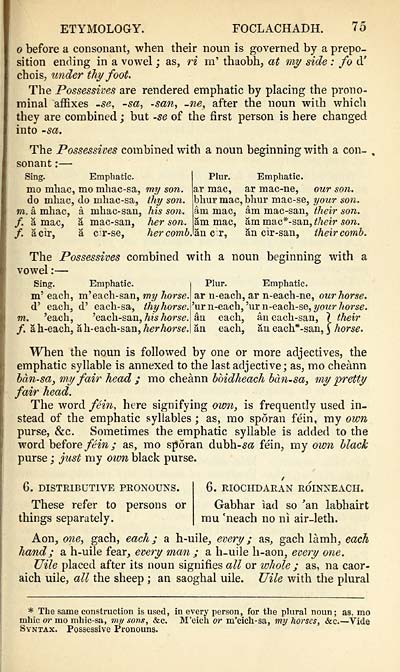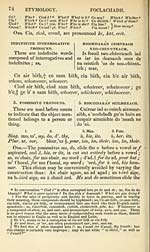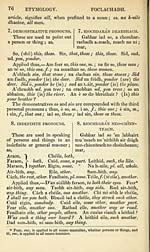Books and other items printed in Gaelic from 1841 to 1870 > Stéidhean a' Ghràmair Ghaëlig
(103) Page 75
Download files
Complete book:
Individual page:
Thumbnail gallery: Grid view | List view

ETYMOLOGY. FOCLACHADH. 75
o before a consonant, when their noun is governed by a prepo-
sition ending in a vowel ; as, ri m' thaobh, at my side : fo d'
chois, under thy foot.
The Possessives are rendered emphatic by placing the prono-
minal affixes -se, -sa, -san, -ne, after the noun with which
they are combined ; but -se of the first person is here changed
into -sa.
The Possessives combined with a noun beginning with a con-
sonant : —
Sing. Emphatic.
mo mhac, mo mhac-sa, my son.
do mhac, do mhac-sa, thy son.
m. à mhac, à mhac-san, his son.
f. à mac, à mac-san, her son.
f. àcìr, à cir-se, hercomb.
Plur. Emphatic.
ar mac, ar mac-ne, our son.
bhur mac, bhur mac-se, your son.
àm mac, àm mac-san, their son.
àm mac, àm mac*-san, their son.
àn c r, àn cìr-san, iheircomb.
The Possessives combined with a noun beginning with a
vowel : —
Sing. Emphatic.
m' each, m'each-san, my horse.
d' each, d' each-sa, thyhorse.
m. 'each, 'each-san, his horse.
f. àh-each, à h-each-san, Aer horse.
Plur. Emphatic.
ar n-each, ar n-each-ne, our horse.
ur n-each, 'ur n-each-se, your horse.
àn each, àn each-san, } their
àn each, àn each*-san, § horse.
When the noun is followed by one or more adjectives, the
emphatic syllable is annexed to the last adjective; as, mo cheànn
bàn-sa, my fair head ; mo cheànn bòidheach bàn-sa, my pretty
fair head.
The word fèin, here signifying ow?i, is frequently used in-
stead of the emphatic syllables ; as, mo spòran fèin, my own
purse, &c. Sometimes the emphatic syllable is added to the
word before fèin ; as, mo spòran dubh-5<s fèin, my own black
purse ; just my own black purse.
6. DISTRIBUTIVE PRONOUNS.
These refer to persons or
things separately.
6. RIOCHDAEAN ROINNEACII.
Gabhar ìad so 5 an labhairt
mu 'neach no nì air-leth.
Aon, one, gach, each; a h-uile, every ; as, gach làmh, each
hand; a h-uile fear, every man ; a h-uile h-aon, every one.
Uile placed after its noun signifies all or whole ; as, na caor-
aich uile, all the sheep ; an saoghal uile. Uile with the plural
* The same construction is used, in every person, for the plural noun; as, mo
mhic or mo mhic-sa, my sons, &c. M'eich or m'eich-sa, my horses, &c. — Vide
Syntax. Possessive Pronouns.
o before a consonant, when their noun is governed by a prepo-
sition ending in a vowel ; as, ri m' thaobh, at my side : fo d'
chois, under thy foot.
The Possessives are rendered emphatic by placing the prono-
minal affixes -se, -sa, -san, -ne, after the noun with which
they are combined ; but -se of the first person is here changed
into -sa.
The Possessives combined with a noun beginning with a con-
sonant : —
Sing. Emphatic.
mo mhac, mo mhac-sa, my son.
do mhac, do mhac-sa, thy son.
m. à mhac, à mhac-san, his son.
f. à mac, à mac-san, her son.
f. àcìr, à cir-se, hercomb.
Plur. Emphatic.
ar mac, ar mac-ne, our son.
bhur mac, bhur mac-se, your son.
àm mac, àm mac-san, their son.
àm mac, àm mac*-san, their son.
àn c r, àn cìr-san, iheircomb.
The Possessives combined with a noun beginning with a
vowel : —
Sing. Emphatic.
m' each, m'each-san, my horse.
d' each, d' each-sa, thyhorse.
m. 'each, 'each-san, his horse.
f. àh-each, à h-each-san, Aer horse.
Plur. Emphatic.
ar n-each, ar n-each-ne, our horse.
ur n-each, 'ur n-each-se, your horse.
àn each, àn each-san, } their
àn each, àn each*-san, § horse.
When the noun is followed by one or more adjectives, the
emphatic syllable is annexed to the last adjective; as, mo cheànn
bàn-sa, my fair head ; mo cheànn bòidheach bàn-sa, my pretty
fair head.
The word fèin, here signifying ow?i, is frequently used in-
stead of the emphatic syllables ; as, mo spòran fèin, my own
purse, &c. Sometimes the emphatic syllable is added to the
word before fèin ; as, mo spòran dubh-5<s fèin, my own black
purse ; just my own black purse.
6. DISTRIBUTIVE PRONOUNS.
These refer to persons or
things separately.
6. RIOCHDAEAN ROINNEACII.
Gabhar ìad so 5 an labhairt
mu 'neach no nì air-leth.
Aon, one, gach, each; a h-uile, every ; as, gach làmh, each
hand; a h-uile fear, every man ; a h-uile h-aon, every one.
Uile placed after its noun signifies all or whole ; as, na caor-
aich uile, all the sheep ; an saoghal uile. Uile with the plural
* The same construction is used, in every person, for the plural noun; as, mo
mhic or mo mhic-sa, my sons, &c. M'eich or m'eich-sa, my horses, &c. — Vide
Syntax. Possessive Pronouns.
Set display mode to:
![]() Universal Viewer |
Universal Viewer | ![]() Mirador |
Large image | Transcription
Mirador |
Large image | Transcription
Images and transcriptions on this page, including medium image downloads, may be used under the Creative Commons Attribution 4.0 International Licence unless otherwise stated. ![]()
| Rare items in Gaelic > Books and other items printed in Gaelic from 1841 to 1870 > Stéidhean a' Ghràmair Ghaëlig > (103) Page 75 |
|---|
| Permanent URL | https://digital.nls.uk/101712835 |
|---|
| Description | Out-of-copyright books printed in Gaelic between 1631 and 1900. Also some pamphlets and chapbooks. Includes poetry and songs, religious books such as catechisms and hymns, and different editions of the Bible and the Psalms. Also includes the second book ever published in Gaelic in 1631. |
|---|

